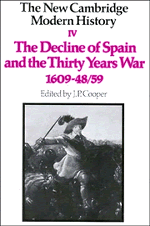Chapter XXII - The European nations and the Atlantic
from THE FRONTIERS OF EUROPE
Published online by Cambridge University Press: 28 March 2008
Summary
Ninety years after the discovery of America ‘we of England could never have the grace to set fast footing in such fertill and temperate places, as are left as yet unpossessed’ by the ‘Spaniards and Portingales’. The Dutch too, still absorbed in their struggle for independence, had got no further than organized defiance of the Spanish trade monopoly. Their East India Company in 1609, as Pieter Both was ordered to acquire ‘a convenient place and, for our contentment, a fort which shall serve as a rendezvous for our whole Indian Navigation’, was still feeling its way towards unified control. More intent on trade than on possession of land, they had not yet staked a claim in the West. The French also, seeking fish and furs rather than colonies, had as yet but the most tenuous hold even on the lower St Lawrence. No country's colonies bore comparison with the Spanish settlements in the Caribbean and on the Spanish Main, or the Portuguese in the Atlantic islands and Brazil; and though the English and Dutch controlled an increasing share of the East Indies trade, and the English and French maintained two or three hundred ships on the Grand Banks of Newfoundland, Habsburg predominance had not been seriously challenged. But a challenging thesis had been formulated.
England had taken formal possession of ‘Virginia’—the whole of eastern America from 30° northwards—and Raleigh's Roanoke voyage had also seen the use of a jointstock organization which distributed the costs of establishing colonies among merchants and speculators. The Roanoke venture, moreover, was a definite attempt at settlement, and that purpose was then transferred from Virginia to Guiana (as it had previously been transferred from 'Norumbega' to Virginia).
- Type
- Chapter
- Information
- The New Cambridge Modern History , pp. 672 - 706Publisher: Cambridge University PressPrint publication year: 1970
- 2
- Cited by



